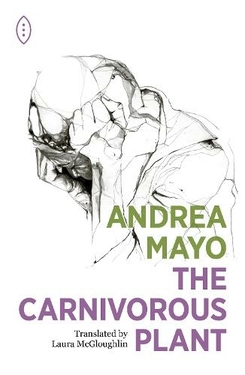It only takes two mirrors to build a labyrinth, said Borges, and in The Carnivorous Plant (2021, tr: Laura McGloughlin, 2022) metaphorical mirrors are hung “in front, behind, above and below” to construct an inescapable maze from which its victim, Andrea Mayo, is in search of an exit. Mayo, it should be said, is a heteronym for Flavia Company, an Argentine writer who first introduced the character in a short story collection and now lets her creation speak.
Mayo’s delivery is short, sharp and rhetorical, as if written in snatched moments. Grouped into sections exploring aspects of the the book’s central relationship (rage, violence, humiliation, etc), the book is a maze of chapters and fitful vignettes that provide context (“You haven’t the slightest idea what it’s like.”) to the toxic experience at the book’s heart. This is a book of first chapters all coming from various angles and cumulatively dissecting a balance tipped in favour of power over love.
The idea of a trap is that we enter them unwittingly and that’s how Andrea has found herself with Ibana, her wife of two years. Ibana is the titular plant, a well-worked metaphor for an abusive partner, but Andrea feels complicit in her own degradation (“I shouted the lie that everything was fine so loudly that it was impossible to hear the shoves, the slaps, the insults, the slamming doors.”). Yet the book is something of a triangle, as the presence of Ibana’s child, who lives with them, suggests further tragedy. The carnivorous plant can only manage one prey at a time, we are told. Were Andrea to escape, what fate the child who craves her mother’s attention?
Awash with metaphors, circling its major plant riff, we see Ibana as a praying mantis, a hammer, a sect, and more. But Mayo also paints her as ultimately human, insecure, her actions rooted in her past now projected on to others. Here the old adage of ‘it’ll never happen to me’ bursts, showing just how universal abuse is and how easily anyone can enter such traps (“They make themselves experts on you”). Mayo’s story is an engrossing and harrowing warning, easily digestible, and when the book snaps shut, you can safely leave it while it may not leave you.
